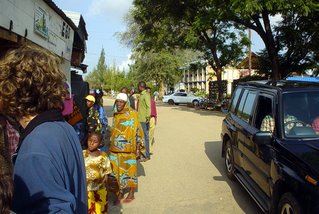Fatness, Part 2
I told a friend of mine about my goal of convincing someone to name a baby Fatness, and to my absolute delight he said “I have a friend named Fatness.” I suppose I do not set my goals high enough. I now hope that I can meet a “Fatness” before I leave.
The teachers told me that often people hear a word or see it written and decide to use it as a name. They said that if the parents are at the hospital and a bus passes, the baby might end up with the name of the bus line. There are luckily no Greyhound buses here, but there is “Superfeo” (which means super ugly in Spanish), and according to the teachers, there are some unfortunate children running around with that tag.
They also claim that if I come back in 15 years I will encounter kids with my name. Somehow I’m not so confident that it would actually be “Gail.” More likely, it would be Gillr, Ger, Girl, or Piskops. It would be worth it to return just to give my condolences to those poor children.
Tuesday I went to help out with the monthly weighing of village babies, and discovered a new hobby: checking out the names on the cards. Here are some of my favorites: Agape, Abass, Big, Godness, Skolastika, Sist, Ravuness, Jailos, Albino, Milkson, Herigod, Heribert, Frolida (I’m sure that’s supposed to be Florida, but they switched the l and the r), Jeronimus, Loines (sorry about that!), Pili (meaning “second”), Sijali (I don’t care), and Hatunahaki (meaning “we have no rights”).
Chuchu the GoatThe other day I helped my friend buy an orphaned goat from an old farmer. We got it back to her house and started trying to feed it random things. It didn’t like powdered cows’ milk from a bottle, but it did have a taste for all the little green things in her courtyard, sausage, spaghetti, and eucalyptus leaves. It was being loud and obnoxious all night, and all of a sudden we heard one of my friends who was sleeping on the floor yell “Quit it!!” I guess the goat had kicked the door until it broke into the house and had crawled into bed with him. As an added bonus, the goat left us presents all over the floor, which were hard to avoid stepping in at 6 am when we had to get up to catch the bus.
Botany and TearsThe other day I stumped my environmental club students when I asked them to compare the functions of a plant to the functions of a human. They had no problem comparing eating food to a plant being out in the sun, having babies to making seeds, drinking to taking up water from the soil. But two questions I asked stumped them. The first was why plants show off their reproductive organs so ostentatiously, while respectable humans (in most societies) hide theirs. The second was why many plants encase their offspring in delicious food, while any human mother with a heart would never stick her baby in a cake and set it out where animals could devour it. They obviously are completely unaccustomed to this type of question, and I had to lead them to the conclusions of pollination and seed dispersal by means of animal digestive tracts (and at this age, anything that even remotely involves poop is hilarious to them). I’m not sure they like the idea of eating swollen ovaries whenever they bite into a fruit, but it gave them something to think about.
After the lesson, I made a few kids cry. It was one of the more rewarding experiences in my teaching history. We played a game where you had to make a circle and say something environment-related within a certain category (for instance edible plants), and then point to another person meaning they had to quickly say another word within the same category. If you delayed or repeated a word, you were in the middle of the circle until someone else messed up. The kids loved the game so much that two or three were laughing so hard they could hardly speak and had tears rolling down their cheeks.
Another Happy WifeOne of my best friends was sold yesterday. I went to her bride-price party, which was much like the last one. I spent most of the time sitting in a dark room with her waiting for the price-negotiations to be done so they could ship her off to her new house, about 4k away. It was sad, and interesting. She had a really horrible cough, but seemed to be in decently high spirits. Mostly I think she was just resigned to her fate. She said she wouldn’t get to rest until midnight, because once she got to her house she would have to unpack everything and cook for her new husband. I managed to shock her with tales of weddings in our culture: she couldn’t imagine the bride and groom dancing together at a wedding, especially in front of their parents. Nor could she believe the bride and her parents are supposed to be cheerful at the occasion.


